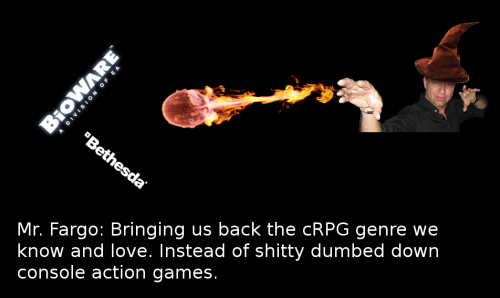- Joined
- Jan 28, 2011
- Messages
- 99,627















Tags: Colin McComb; InXile Entertainment; Kevin Saunders; Kickstarter; Torment: Tides of Numenera
The Penny Arcade Report has a new interview with Torment: Tides of Numenera leads Kevin Saunders and Colin McComb. It provides some details about the genesis of the project last year, and shows the lengths to which the two went to make it all happen. Here's an excerpt:
The Bard's Tale - an unlikely savior of the RPG genre. But wait, there's more. After briefly discussing their strategy for designing the game based on an unknown level of funding, including a nice knock at multiplayer and microtransactions, there's this gem:
Oh yes.
Update: There's another interview with Colin and Kevin, this time at the website Colony of Gamers. This one is longer and more in depth. Have a snippet:
When do we get a Codex interview?
The Penny Arcade Report has a new interview with Torment: Tides of Numenera leads Kevin Saunders and Colin McComb. It provides some details about the genesis of the project last year, and shows the lengths to which the two went to make it all happen. Here's an excerpt:
“I started with inXile in November, I was referred here by Chris Avellone, who is working on Wasteland 2, he knew they were looking for a producer for the next project. I talked to Brian [Fargo], and learned it was Torment, and I was interested. I was hired to lead this pre- pre-production and to lead the Kickstarter effort,” Kevin Saunders explained.
It wasn’t hard to find people willing to provide the early labor. “The power of Planescape: Torment is such that there are so many people who worked on it, or loved it, that when we let it be known that we were exploring it they offered a lot of help,” he explained. “People that we worked with in the industry, people with full-time jobs asked if there was anything they could do to help out. We had good support from the beginning.” Saunders was a contractor whose job was to get the project off the ground. During that time he received another job offer, and brought it to Fargo to see if inXile could match it. He was told it was dependent on the success of the Kickstarter. The worst case scenario is that he could continue on through the month for health insurance. The best case scenario was that the Kickstarter was funded and he’d get the chance to work on the spiritual successor to one of the best-loved role-playing games of all time. He decided to stay on.
One of the pleasant surprises that allowed this to happen was that Bard’s Tale on Android was a success, allowing some leeway in terms of the budget leading up to the Kickstarter. Even so, this was a leap of faith for many involved; McComb hadn’t been taking a salary until the Kickstarter, he was in the project because he wanted to make the game.
If the Kickstarter wasn’t funded, the project would have gone away, and the work would have been done for free. “It would have been a sunk cost. We’ve been designing this on a shoe-string at this point,” McComb explained. “We don’t want to impact the development budget of Wasteland 2, because that’s money backers devoted specifically to Wasteland 2. Brian promised he wouldn’t be using that money for Torment.” They launched the Kickstarter hoping for the best. The rest is history.
The Bard's Tale - an unlikely savior of the RPG genre. But wait, there's more. After briefly discussing their strategy for designing the game based on an unknown level of funding, including a nice knock at multiplayer and microtransactions, there's this gem:
The success of the Kickstarter showed that there’s a hunger for this sort of role-playing game, and I asked if that was an itch that wasn’t being scratched by games like Dragon Age.
“I don’t know, they sold a lot of units.” McComb said, laughing. “We have a different audience. I don’t want to make generalizations about the target metric and age for Dragon Age, but ours is hearkening back to a more philosophical, story-driven thing. All respect to the guys at Bioware, because I mean no disrespect, but I think that people are looking for a really reactive, really involved storyline that they have some control over, rather than just an interactive movie with player-controllable combat.”
Oh yes.
Update: There's another interview with Colin and Kevin, this time at the website Colony of Gamers. This one is longer and more in depth. Have a snippet:
CoG – Are you taking any cues from more modern RPGs?
Colin – A lot of current games are going for a more cinematic experience. What we’re going for is a more personal narrative. We want to make this feel like a truly epic story for the person involved. The stories in current RPGs always seem to be about saving the world, or do something important or millions of people will suffer. We wanted to tell a story that would be inward, more introspective thing that still feels like a tremendous story.
Kevin – We do want to iteratively innovate on things like game interface designs. Technology today can do things easier than it was back then. Unity is a great engine to work with. We’re not trying to create the same experience as Planescape from that perspective. We want to make use of things we’ve learned over the years. We want to improve the dialogue system in Torment.
Colin – We’re looking to avoid the traditional “hub and spoke” model of dialogue trees. We’re hoping to update that, but I can’t give anything away just yet. We want to make more of a “rolling hub and spoke system” where it would flag a line of dialogue that has already been used.
Kevin – Another thing we’ve talked about regarding Planescape Torment, as much as it’s acclaimed, it is not well known for the quality of the combat. We’re not emulating that aspect of the game. We want to tie the combat to the narrative. This isn’t going to be an action RPG by any means. We want to follow in Planescape’s tradition of most if not all combat avoidable or at your discretion. We do want the combat to be exciting and rewarding.
When do we get a Codex interview?


















![Glory to Codexia! [2012] Codex 2012](/forums/smiles/campaign_tags/campaign_slushfund2012.png)












